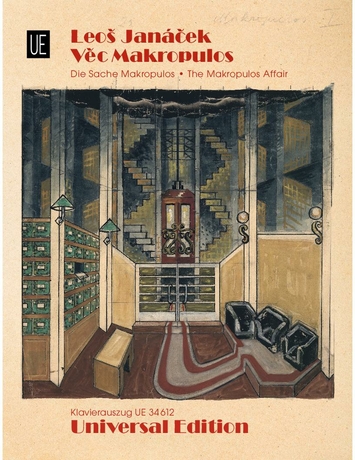.png)
Payments:
Shipping:
Leoš Janáček
Janáček: The Makropulos Affair
Dichter der Textvorlage: Karel Capek
Übersetzer: Norman Tucker Max Brod
Herausgeber: Jiří Zahrádka
Libretto von: Leoš Janáček
UE34612
Type: Klavierauszug
Languages: Deutsch | Englisch | Tschechisch
Format: 232 x 305 mm
ISBN: 9783702473709
Pages: 336
ISMN: 979-0-008-08699-1
Payments:
Shipping:
Description
Notes on the issues concerning this edition
In the new critical edition of the opera The Makropulos Case by Leoš Janáček, the performance material has been completely reworked on the basis of all the preserved sources. The revision of the score involved a comparison of the autograph score with three copies that originated during the composer’s lifetime.
The primary source is the copy that was prepared by Václav Sedláček for the publishers Universal Edition and that contains the subsequent corrections. This copy was used by the conductor Otakar Ostrčil in 1928 during rehearsals for the Prague premiere of the opera at the National Theatre, which was attended by Janáček himself. The second copy was produced by Jaroslav Kulhánek and was used for the first performance of the work at Brno National Theatre conducted by František Neumann. Janáček was actively involved in the rehearsals for this performance. The third copy contains Act One and was prepared in 1926–1927, also for Universal Edition. Additional important sources which influenced the text of the new edition are the handwritten piano score by Ludvík Kundera with corrections entered by Janáček, three handwritten piano scores from the Brno premiere, and also the proof and first print of the piano score. The original handwritten orchestral and choral parts from which the work was played and sung for the first time and also the vocal soloist parts that have been preserved are also significant. Three copies of Čapek’s drama The Makropulos Case with handwritten changes and corrections by the composer were treated as authoritative for the wording of the opera text. The new edition also takes into consideration Janáček’s corrections to the score which have been preserved in private collections, for example. Finally, the lengthy correspondence between Janáček and the conductors, the publishers Universal Edition and the translator Max Brod, for example, also played an important role in determining the work’s final form.
The new critical edition therefore presents the work in a form that corresponds to the greatest possible extent to the ideas of the composer, taking all the relevant sources into account. In a departure from the earlier edition, the extreme instrumental pitches typical of Janáček have returned following their elimination by the copyists (Sedláček and Kulhánek played in the Brno orchestra and were aware of details such as the theatre’s lack of a double bass with an extra 5th string for lower notes). This edition also uses the spectrum of instruments envisaged by Janáček, with special instruments such as the viola d'amore, the children’s drum and, as mentioned above, the five-stringed double bass. Minor instrumental additions of unknown origin have been removed from the score and errors have been rectified, including incorrectly notated metre. The dynamics are a separate issue. At first Janáček only gave a rough idea of the dynamics and did not enter any markings at all in the vocal parts. These approximations were elaborated in more detail for the first performance. Janáček played an active role in the rehearsals and he regarded the dynamics entered by the conductor František Neumann as exemplary. However, they were not included in the printed edition and over the course of time the entries in the score, which was still in use in the 1990s, were covered by markings written by other conductors. With the benefit of his experience from other editions of Janáček’s works, the editor has been able to reconstruct the dynamics entered by František Neumann by comparing the sources and has integrated them into this new edition. The same applies to the expression marks and some phrasing.
The new edition of the opera The Makropulos Case has been edited by PhDr. Jiří Zahrádka, who has been curator of the Janáček Archive at the Moravian State Museum for 20 years and has written numerous studies on the life and work of Leoš Janáček. His latest publications include the book ‘Theatre must not be Comedy for the People’. Leoš Janáček and the National Theatre in Brno. Jiří Zahrádka has also edited the new critical editions of many more works by Leoš Janáček such as Šárka, Osud (Destiny), The Excursions of Mr. Brouček, The Cunning Little Vixen, the Glagolitic Mass, the Sinfonietta (in preparation) and chamber music. He is also working on a critical edition of Leoš Janáček’s complete correspondence.
The new critical edition will be fully available from the 2015/2016 season. Unlike the Bärenreiter edition published at about the same time, Universal Edition’s new edition has taken advantage of all available sources, including the aforementioned duplicate of the full score by Janáček’s principal copyist Václav Sedláček. This manuscript, housed in Universal Edition’s archive, may well be considered the work’s most important primary source, since the composer had it sent to his publisher Universal Edition immediately after the first performances and resultant corrections as its complete and definitive version.
More information
Type: Klavierauszug
Languages: Deutsch | Englisch | Tschechisch
Format: 232 x 305 mm
ISBN: 9783702473709
Pages: 336
ISMN: 979-0-008-08699-1

